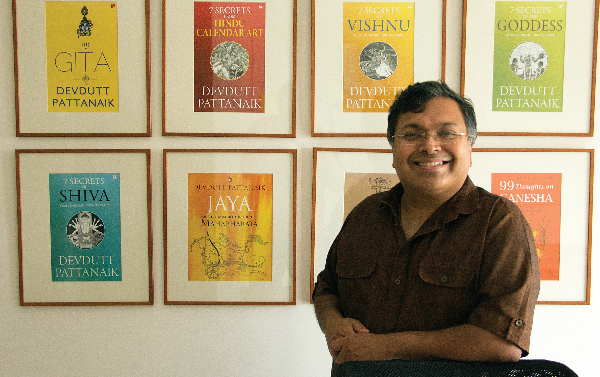Known to wear many hats - that of a doctor, a writer, a speaker, a story consultant, an illustrator and a person who has incorporated Hindu scriptures into human resource management, Dr Devdutt Pattanaik speaks to #TGLIFE on his take on myths and facts

#TGLIFE: How would you differentiate between history and mythology?
Dr Devdutt Pattanaik: History is story of dead people. Mythology is story of timeless gods.
TG: Why do you feel that today' generation is turning to spirituality, or looking out for answers in spiritual way of life?
DP: Science and rationality does not give meaning to life. It gives material comforts, but not connection with our inner selves and with cosmos at large. So we turn to spirituality.
TG: Where can we draw the line between myths and facts? As a medical person, please explain the similarities and differences between science and myth, if any.
DP: Fact is everybody's truth. Fiction is nobody's truth. Myth is somebody's truth. Fact is living organisms eat food when hungry. Fiction is pigs can fly. Myth is every living creature has a soul. Soul cannot be mathematically measured and so its existence cannot be ever proven; it remains a matter of faith, a belief, an assumption, a myth.
TG: What do you find common in the beliefs of people living in different continents?
DP: Some people believe in God, some in soul, some in karma, some in justice and equality. All these are beliefs and assumptions that shape our life. These are the myths as they do not exist materially; we believe in their existence conceptually.
TG: How can one mix and match or weave myth into business, management and life?
DP: Management looks at life as a problem and so seeks to find a solution. This way of looking at the world is mythic. It is classical western myth which is based on a goal or objective. Indian myth sees every event as a consequence. So every solution creates new problems. Every action has reaction. There is no end point or goal. Just a series of events!
TG: How did you manage to retell the entire Mahabharat in just 36 tweets and the Bhagwat Geeta in 18 tweets? People spend their entire lives in studying these great epics of ancient India and yet have failed to know them in their entirety...
DP: All stories have a basic seed of an idea that is expanded into many branches. These tweets capture the seed, not the branches of the tree.
TG: Your studies in medicine and your job in pharma and your deep interest in mythology... how can we combine the three? Who or what inspired you towards myth?
DP: Medicine as a science teaches you systematic and analytical thinking. Pharma companies teach you about business, buying and selling. Mythology demands analytical, systematic thinking and making it relevant to modern times. Thus they are all interlinked. Myth was a hobby; nothing inspirational. Over time the hobby became a vocation.
TG: Underline the difference between mythological fiction and mythology?
DP: In mythological fiction, the author presents his views via the story; he is a lawyer and judge, more often than not. In mythology, the author explores the story and seeks to understand what the ancestors were trying to communicate.
TG: When you say that no society can exist without its myths, whether good or bad, true or false, heaven or hell, rights and duties... any examples?
DP: The American president holds the Bible while taking oath of office. The Saudi Royal family believe they are appointed to take care of Mecca. Britain has its own Church different from Roman Church, which is different from American Church which is different from Russian Church; but they all believe in one God. Chinese, especially Han Chinese, have always believed that Beijing is the centre of the world. Thus there is myth everywhere.
TG: Your book ‘My Geeta' is said to be the book of many firsts but the book has attracted criticism too...
DP: Every good book attracts criticism. That's natural. This is especially true if a book challenges old out-dated modes of thinking and so questions old assumptions of traditionalists. Dyaneshwar and Tukaram were fiercely opposed to bringing the word of God in Marathi rather than Sanskrit. It was true 500 years ago; it is true even today.
TG: Our scriptures are in Sanskrit. As you are not a Sanskrit scholar, what makes it possible for you to translate scripts from Sanskrit to English, given the fact that you do not know Sanskrit?
DP: I don't have to. There are hundreds of very competent translators around the world who have translated it and published their translations. The problem is not translation; the problem is analytical and critical thinking of the words and the verses and the context, which few do well. The great Alvar and Nayanar poetry is in Tamil, and chanted before Sanskrit hymns in South India. And why do you assume wisdom comes in Sanskrit? Why do you assume God speaks in Sanskrit, or Arabic, or Hebrew or Latin or Tamil? Because a ‘brahmin' told you so? These same ‘brahmins' believed women are inferior to men, and that sanitary workers are lesser human beings than priests. Let/s outgrow such superstition. Wisdom has no language.